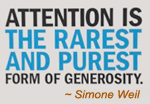 In an article from The New York Times Magazine (“The Generous Marriage,” 12.11.11), Tara Parker-Pope shared the latest research from the University of Virginia’s National Marriage Project. According to this study, GENEROSITY — “the virtue of giving good things to one’s spouse freely and abundantly” — was a predictor of “very happy” marriages.
In an article from The New York Times Magazine (“The Generous Marriage,” 12.11.11), Tara Parker-Pope shared the latest research from the University of Virginia’s National Marriage Project. According to this study, GENEROSITY — “the virtue of giving good things to one’s spouse freely and abundantly” — was a predictor of “very happy” marriages.
* * *
From tribesmen to billionaire philanthropists, the social value of generosity is already well known. But new research suggests it also matters much more intimately than we imagined, even down to our most personal relationships.
Researchers from the University of Virginia’s National Marriage Project recently studied the role of generosity in the marriages of 2,870 men and women. Generosity was defined as “the virtue of giving good things to one’s spouse freely and abundantly” — like simply making them coffee in the morning — and researchers quizzed men and women on how often they behaved generously toward their partners. How often did they express affection? How willing were they to forgive?
The responses went right to the core of their unions. Men and women with the highest scores on the generosity scale were far more likely to report that they were “very happy” in their marriages. The benefits of generosity were particularly pronounced among couples with children. Among the parents who posted above-average scores for marital generosity, about 50 percent reported being “very happy” together. Among those with lower generosity scores, only about 14 percent claimed to be “very happy,” according to the latest “State of Our Unions” report from the National Marriage Project.
“In marriage we are expected to do our fair share when it comes to housework, child care and being faithful, but generosity is going above and beyond the ordinary expectations with small acts of service and making an extra effort to be affectionate,” explains the University of Virginia’s W. Bradford Wilcox, who led the research.
“Living that spirit of generosity in a marriage does foster a virtuous cycle that leads to both spouses on average being happier in the marriage.”
Social scientists are now wondering if this virtuous cycle extends to children too. In a study of 3-year-old twins, Israeli researchers have identified a genetic predisposition toward generosity that may be further influenced by a parent’s behavior. Preliminary findings suggest that children with more-engaged parents are more likely to be generous toward others, which may bode well for their future relationships — and their parents’ too.
“We see meaningful differences in parents’ behaviors,” said Ariel Knafo, the principal investigator and a psychologist at Hebrew University in Jerusalem. “In the long run we’d like to be able to see whether it’s children’s generosity that also makes parents more kind or the other way around. Probably it’s both.”
* * *
How does your relationship rate on the generosity scale?
The following are the four questions posed by researchers from the University of Virginia’s National Marriage Project to measure generosity (answer choices: never; seldom; sometimes; often; always).
- How often do you express affection or love to your partner?
- How often do you express respect or admiration to your partner?
- How often do you perform small acts of kindness for your partner (like making him/her coffee in the morning)?
- How often do you forgive your partner for his or her mistakes and failings?